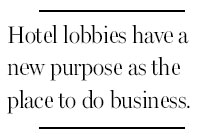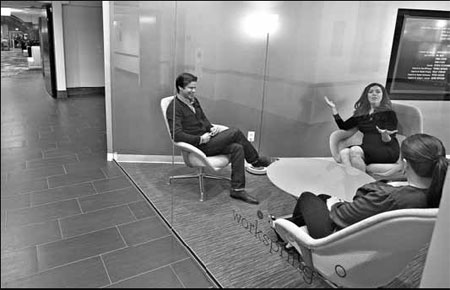Paying hourly for office space
Updated: 2013-03-10 07:50
By Martha C. White(The New York Times)
|
|||||||||
|
Marriott offers small meeting spaces at about three dozen hotels in the United States, including this one in Redmond, Washington. Kevin P. Casey for The New York Times |

Some hotels are starting to manage visitors' use of seats, tables and nooks - and, in some cases, charging for it. For the hotels, the space has become a source of additional revenue and new customers who live and work nearby.
Sonja Fisher, a sales engineer in California, is among them. "I've worked in Starbucks, apartment building conference rooms, restaurants, libraries," she said. "Hotel lobbies have become very convenient."
Ms. Fisher said that paying to guarantee use of a suitable work space would be a worthwhile trade-off.
"We're a small company and we have limited conference space," she said. "I can see where they'd be O.K. with expensing that."
Julie Germany, a vice president at the DCI Group, a public affairs consulting company, said she preferred lobbies and other hotel public spaces to conference rooms for networking and collaboration. "It's a more casual setting," she said. "People are more open to talking."
That informality can have a downside, though. Travelers have no way of knowing beforehand if a couch, table or nook will be available, and the amount of traffic passing through - especially when the hotel bar is nearby - may make serious or confidential discussion difficult.
Nancy Butler, a business coach, has used hotels to meet clients after giving up her physical office, she said, but privacy is always her top consideration. "We need to be able to speak without everybody around us overhearing," she said.
Ms. Butler's second concern is table space for taking notes. "If I have to do that in my lap, that's tough," she said.
Mark Gilbreath, chief executive of LiquidSpace, an online booking platform that offers short-term work spaces by reservation, said he had found that "people are increasingly leaving work to get work done." Hotel space makes up about 10 percent of his inventory, Mr. Gilbreath said, and is the fastest-growing category in the 250 cities across the United States the site serves.
Marriott offers what it calls Workspace on Demand at roughly three dozen hotels, primarily in the San Francisco and Washington areas for gatherings of 10 or fewer people. "The way people work is changing," said Peggy Roe, a vice president at Marriott International. "Work is more social and mobile."
The Westin brand has introduced a similar concept of work space at two American hotels, in Boston and Arlington, Virginia, and at a hotel in Munich. In Arlington, the company turned the business center into a more modern, free-form work area with Wi-Fi and couches.
Brian Povinelli, a Westin executive, said, "When we looked for real estate in the hotel, we came to the conclusion pretty quickly that the old business center is pretty irrelevant for today's traveler."
The New York Times
(China Daily 03/10/2013 page10)
